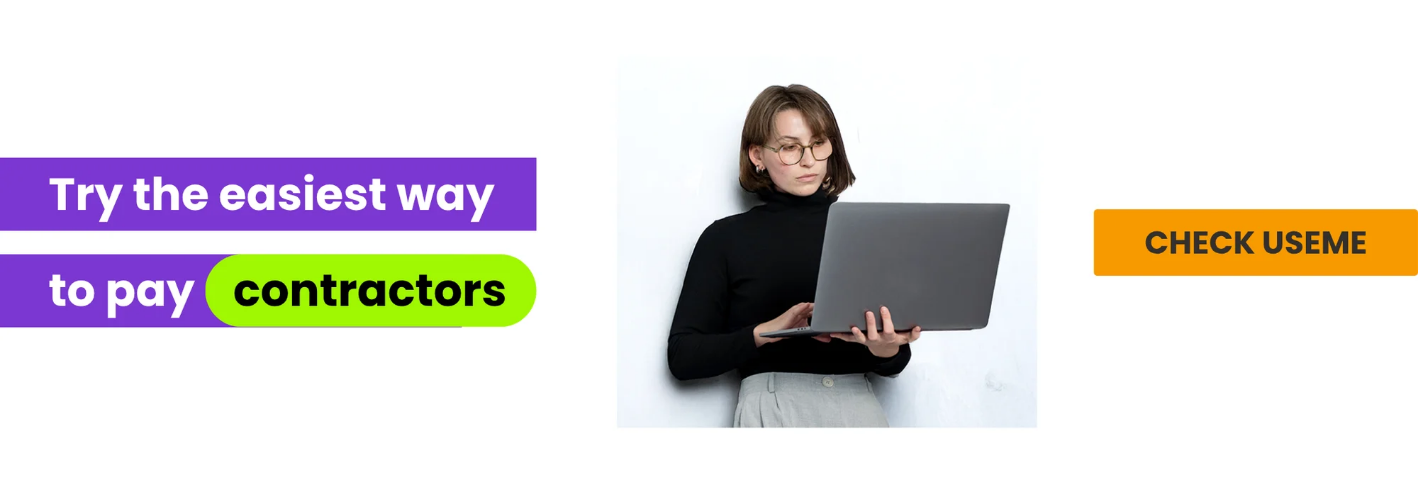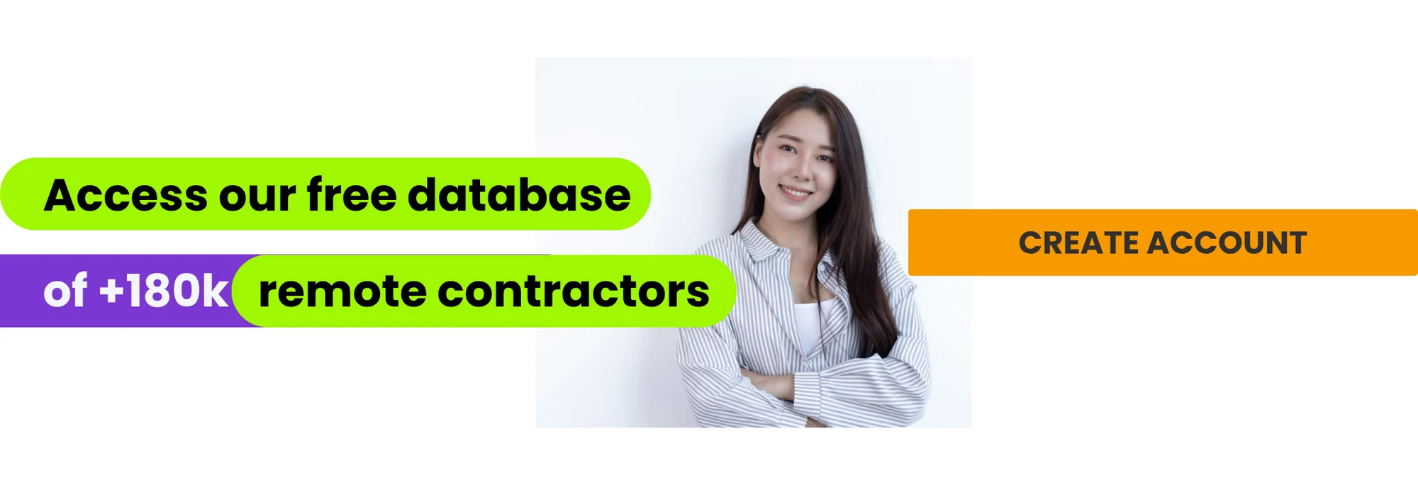Even though freelancing is all about liberty – for both parties – it does need to operate within a legal framework. This includes payments, formalities and law regulations that are related to doing business with freelancers.
Hiring freelancers is a smart way to grow your business in today’s fast-moving business world. Freelancers bring flexibility, technical knowledge, and access to top talent across various fields. Whether you need graphic designers, content creators, or developers, freelancers can help you complete specific projects quickly and efficiently.
This guide explains:
- The benefits of hiring freelancers.
- How to find freelancers for your team.
- Tips for a smooth hiring process.
- Key things to remember, like contracts and payments.
If you’re ready to save time, reduce costs, create more, and work with top professionals, this guide will show you how to make hiring freelancers a sensible business decision. Let’s go!
Key takeaways
- Hiring freelancers reduces costs by eliminating expenses like office space, equipment, and employee benefits while giving you access to global talent pools.
- Clear contracts, proper payment systems, and intellectual property agreements protect both parties and ensure smooth collaboration.
- Platforms like Useme simplify the hiring process by handling contracts, payments, and administrative tasks automatically.
- Evaluate both hard skills (technical abilities) and soft skills (communication, reliability) to find freelancers who deliver quality work and align with your business goals.
Who is a freelancer?
A freelancer is a self-employed professional who provides services to businesses on a temporary or project basis. Unlike full-time employees, freelancers are not part of a company’s internal staff. They work independently and are hired to complete specific tasks, solve problems, or deliver defined results.
From a business perspective, freelancers operate as external partners. They manage their own time, tools, taxes, and benefits. They are paid for outcomes or hours agreed in a contract, not for long-term employment. This makes them a flexible resource for companies that need skills without committing to permanent hires.
Also, freelancers work across many industries. Common examples include designers, developers, writers, marketers, consultants, analysts, and project specialists. Many focus on a narrow skill set, which allows businesses to access expert knowledge exactly when it’s needed.
Freelancer vs independent contractor vs employee vs employee: who do you need
It’s also useful to understand how freelancers differ from independent contractors and employees. In everyday business language, freelancer and contractor are often used interchangeably, but there are practical distinctions.
Freelancers usually work with multiple clients at the same time. They focus on short-term or clearly defined projects, often in creative or digital fields.
Independent contractors may work under a longer agreement with one company. Sometimes they work on-site and are more common in consulting, IT, or specialized professional services. Contractors typically work on extended projects with defined timelines, while freelancers undertake projects with or without set deadlines.
Employees work directly for your company on a long-term basis. They work under the company’s control and supervision, following its schedules and processes. As an employer, you provide them with benefits like health insurance, paid time off, and retirement contributions. Employees are integrated into the company’s structure and work a set number of hours per week.
For businesses, the key differences come down to:
- Control: employees work under direct supervision. Contractors and freelancers set their own methods and schedules.
- Duration: employees are permanent hires. Contractors work for defined periods. Freelancers take on individual projects.
- Costs: employers handle all tax withholding and benefits for employees. Freelancers and contractors manage their own taxes and expenses.
- Commitment: employees focus solely on your company. Contractors may work exclusively during their contract. Freelancers juggle multiple clients simultaneously.
🔍 More about the distinction in our article: Freelancer vs independent contractor: which one is right for your business?
Benefits of hiring freelancers
Hiring freelancers brings many advantages for businesses looking to scale their workforce, complete projects, or access top talent without the long-term commitments of traditional hiring. Here are the key benefits:
Flexibility and cost-effectiveness
According to a 2024 report, companies using flexible talent models can reduce labor costs by up to 30% compared to traditional employment. Freelancers offer businesses the flexibility to hire for specific needs and short-term goals. Instead of committing all resources to full-time employees, you can:
- Scale your team up or down depending on project demand.
- Avoid costs like office space, equipment, or employee benefits.
- Pay only for quality work delivered, keeping expenses under control
Example: If you need to redesign your website, hiring a freelance graphic designer or developer allows you to complete the task efficiently without long-term costs.
Flexibility and cost-effectiveness make hiring freelancers a smart choice for businesses of all sizes.
Access to global talent
Online platforms and services like Useme, Fiverr Marketplace, or Guru connect businesses with skilled freelance talent worldwide. You’re no longer limited to local candidates, which allows you to work with foreign freelancers. Why it matters:
- Find top professionals with specialized skills in various fields, from content creation and graphic design to software development.
- Use platforms to search for candidates, review their portfolios, and select the right freelancers.
- Collaborate with talent across different time zones to ensure faster delivery of projects.
Tip: Some platforms may even offer access to a dedicated account manager to assist with finding and managing freelancers, ensuring a smoother and more efficient hiring process.
Specialized expertise
Freelancers are often industry experts, offering specialized knowledge and hands-on experience to deliver high-quality results. Whether you need help with lead generation, content marketing, social media, or a specific project, freelancers have the skills to match your business goals.
Key benefits of specialized expertise:
- Access experts without the need to train your internal team.
- Complete complex projects faster with the help of skilled professionals.
- Benefit from freelancers’ niche experience and innovative approaches.
Example:
Do you need a compelling social media campaign? A freelance marketing expert can create targeted content to boost engagement and drive results without hiring someone full-time.
Pros and cons of hiring freelancers
Hiring freelancers has many advantages, but there are also a few challenges to remember.
Pros of finding freelancers
- Speed – freelancers can start quickly, reducing recruitment time.
- Flexibility – you can hire freelancers based on demand for short-term or long-term projects.
- Cost savings – pay only for completed work, with no overhead costs.
- Access to expertise – work with professionals who bring valuable skills to your team.
Cons of hiring freelancers
- Communication issues – working with freelancers across different time zones can sometimes delay responses.
Solution: Use platforms like Useme, including built-in messaging and file-sharing tools, to ensure clear collaboration.
- Less control – freelancers manage their schedules, which may not always align with yours.
Solution: Use clear deadlines to keep projects on track.
- Project consistency – freelancers might not fully understand your vision without strong communication.
Solution: Share detailed briefs and feedback to align expectations early.
As a freelance PR and communications consultant working across the US and Europe, I’ve seen how valuable freelancers can be.
The biggest advantage is perspective. Freelancers move between industries and countries. They often spot patterns internal teams miss.
However, freelance work only stays agile when formalities are clear. Early in my career, I underestimated admin tasks like invoices and contracts. This caused delays and extra costs.
Even small businesses should invest in solid contract templates. Clear timelines, deliverables, and payment terms prevent conflict.
From experience, delayed payments are one of the biggest risks. Including late-payment clauses is not optional. It protects both sides.
– Mila Che, Global PR Strategist with Proven Freelancer Collaboration Expertise Across the US and Europe
How to find the best freelancers and improve the hiring process
Hiring freelancers doesn’t have to be overwhelming. With the right approach, you’ll streamline the process and connect with top talent efficiently. Here’s how:
💡 Download the 2025/2026 Business Report and see the data proving which talent you need to hire – click here to download the report.
Know where to look
Freelance platforms like Useme, Fiverr, Upwork, and Remote make finding talent easy. You can:
- Search for freelancers by skills or industry.
- View portfolios and experience.
- Check ratings and client reviews to ensure reliability.
Tip: Platforms like Useme simplify payments and contracts so you can focus on the project, not admin task.

Create clear job descriptions
Attract the right candidates with detailed job postings. Include:
- Project goals and deliverables.
- Required skills and experience.
- Timelines and budget expectations.
Clear descriptions set expectations from the start, making finding the best match for your project easier.
→ Check out our guide on how to write a job description for practical tips to create postings that attract top talent.
Prioritize communication
Before hiring, schedule a quick call or chat to:
- Discuss project details.
- Confirm availability and relevant experience.
- Gauge communication style – essential for smooth collaboration.
Choosing a freelancer who aligns with your company and goals and communicates well is key.
Onboard effectively
Once you hire people, set your freelancer up for success. Share:
- Necessary tools and logins.
- Brand guidelines or briefs for freelancers.
- Clear explanations of your processes.
Smooth onboarding allows freelancers to deliver high-quality work quickly.
Evaluate hard and soft skills
Hard skills are the foundation of expertise – measurable, technical abilities that allow freelancers to deliver quality work. Depending on the project, you might look for:
- Technical proficiency: coding, graphic design, SEO, copywriting – skills matching project requirements.
- Industry-specific tools: familiarity with software like Adobe Suite, Figma, WordPress, or programming languages (e.g., Python, JavaScript).
- Portfolio and results: previous projects, certifications, or measurable outcomes, like increased web traffic, improved designs, or optimized code.
Why do they matter? Hard skills ensure the freelancer has the technical ability to complete tasks to your standard.
Soft skills are often what differentiates a good freelancer from a great one. These include:
- Clear communication: freelancers must articulate project updates, ask relevant questions, and understand your feedback. Miscommunication can lead to delays or rework.
- Time management: effective freelancers respect deadlines and proactively plan their workload to stay on track.
- Adaptability: freelancers work with diverse teams and projects. Flexibility in learning new tools or handling changes is a huge asset.
- Problem-solving: freelancers with initiative and a solution-oriented mindset keep the project moving forward when challenges arise.
- Reliability: consistency in delivering high-quality work builds trust and strengthens long-term partnerships.
Why do they matter to most freelancers? Even the most skilled freelancers can fall short if they lack soft skills like communication, flexibility, or time management.
The best freelancers combine strong hard skills with outstanding soft skills.
For example:
- A developer with expertise in coding but who also explains complex problems in simple terms.
- A graphic designer with a creative vision who proactively meets deadlines and incorporates feedback.
Navigating the legal labyrinth – law & regulations
Working with freelancers brings flexibility and access to top talent, but ensuring your legal and secure collaboration is essential. Understanding contracts, payments, and intellectual property rights will protect your business and the freelancer.
Contracts and agreements
Always remember to base your cooperation on contracts. A clear and fair agreement can eventually spare you a lot of trouble. Some of the most common contracts that can be used if you want to hire freelancers include:
- Specific-work contract – the most flexible contract available for freelance work. This civil law agreement is usually signed when one party commissions a specific project – e.g., logo design, mobile app development, photo shoot, article proofreading. This contract should be as specific as possible, providing detailed deadline information, remuneration, and payment, among other important factors.
- Contract of mandate: a civil law agreement that can be shaped to fit the project’s needs. It also allows the employer to pay social contributions. If the work performed under this contract resembles actual employment, it should be terminated and converted to a proper employment agreement.
- B2B contract: when a freelancer is a legal entity (juridical person). They agree with your business, and you agree on specific contractual arrangements for a particular project or long-term cooperation.
- Hire a freelancer through a remote work platform: some platforms let you legally collaborate and pay freelancers without signing any contract with a subcontractor. One of them is Useme.
Useme becomes the legal employer of your freelancers and signs a contract with them on your behalf. The platform additionally takes care of all administrative tasks related to hiring. Then, they resell the freelancers’ work based on buy-sell transactions. After a successful collaboration, you receive a tax invoice regardless of whether your freelancer has their own company. In practice, the freelancer uploads the work you ordered into the system, and you pay a deposit request. Although the job portal charges a service fee for such transactions, the total cost on your side is still less than that of signing a work contract. If you want to start settling deals with freelancers through Useme, you must fill out the form inviting your freelancer to settle a deal.
How to pay your freelancer
Paying freelancers efficiently and fairly is essential for a smooth collaboration. Whether you’re working on a specific project or a long-term partnership, a clear payment process builds trust and ensures the timely delivery of quality work.
Freelancer status
Another important issue related to the agreement between you and your freelancer is properly recognizing your freelancer.
- Are they your employees?
- Do you need to contribute to their social insurance?
- Can you expect them to work in specific hours or across different time zones?
- Are they entitled to any benefits based on the work they do for you?
It often depends on whether your country (or the freelancer’s country) recognizes freelancing as work or considers them independent contractors. If you want to hire freelancers legally, consider these country-specific criteria.
Tip: Before signing a contract, review all the details and address any doubts. Ensure the agreement is mutually beneficial and reflects the freelancer’s status.
Take care of intellectual property if you want to hire freelancers
If you are working with a freelancer, you must consider intellectual property (IP) rights, especially if you will use their work to gain revenue. To avoid any IP disputes in the future, make sure your contracts outline the project’s specifics: attribution (if any), use, modification, and distribution of work.
If freelancers want to showcase your project as part of their portfolio, discuss it with them beforehand and make sure it is clearly stated in the contract before you decide to hire freelancers.
- The license grants you the right to use the commissioned work for 15 years. It doesn’t require signing printed documents on Useme, and the freelancer retains the right to sell the work to others.
- The copyrighting protocol requires an additional form, but it guarantees that your project will not be sold to other clients.
Ensure that all agreements with your freelancer are clearly outlined in the contract to prevent future disputes regarding intellectual property.
Non-disclosure agreements (NDAs)
Confidentiality is now a vital part of many businesses. If you feel like the work you are getting a freelancer to do is sensitive, consider drafting a non-disclosure agreement in addition to a standard agreement (or as part of it). If done well, an NDA will protect not only your intellectual property but also your know-how, the name of your business, and other aspects.
Some entrepreneurs sign an NDA with a freelancer before sharing business-sensitive information or signing the contract. Decide what is best for your business.
Special Q&A for you
Hiring freelancers can be a difficult task. If you’ve got any questions, then we’re here to help.
Ask our team of business experts, industry specialists and lawyers – we’ll come back with the best answers.
Fair pay and fair play
Both you and your freelancer are doing this for the money. That is why thoroughly reviewing payment details when hiring freelancers is so important. This should be a non-negotiable element of your freelancer onboarding checklist.
As a commissioner, you should know your budget and the market rates for the project you want to start. If it isn’t a similar amount, it may indicate that it might be harder to find a suitable freelancer to do the job.
Try to be reasonable about the money you are giving to a freelancer. It is a fair price if it corresponds to the average market pay.
How to pay your freelancer
Are you wondering how to pay your freelancer? Setting the payment amount is one thing, but handling billing is another. There are many payment options to choose from – it all depends on the character of the work, the industry, and particular arrangements between you and your freelancer.
Tip: Some freelance work can be paid hourly or in-stage payments (according to the project’s progress). If you know the freelancer well and trust them, payment in advance is an option.
However, the most common payment is made after the task is completed and delivered to the commissioner. This seems fair, but some freelancers might not be happy with this particular solution.
Escrow payments
This is where escrow payments come in handy. In an escrow payment transaction, a commissioner pays in advance, and a freelancer is informed about the deposit made. They begin work on the project, and once it is finished and accepted by the client, they receive their payment.
Meanwhile, the money is stored securely on a dedicated platform. This solution guarantees transaction transparency and is a good compromise for both parties.
Useme is a freelance website and platform that uses escrow payments to ensure the highest satisfaction rates among freelancers and their clients.
Of course, other forms of payment are available – a simple bank transfer, a payment platform (e.g., PayPal), or even cash. Nevertheless, escrow payments are on the rise, and their convenience is a strong argument for using them.
Currency rates & fees
Always remember who you are working with. If you hire a foreign freelancer whose remuneration is in a foreign currency, pay attention to currency exchange rates. Making a wire transfer can also entail some exchange fees.
Try to find solutions that do not incur extra costs while paying the highest possible amount to the freelancer. Going the extra mile to find a satisfying compromise can be an excellent foundation for a good business relationship with a valuable freelancer.
Foreign freelancers – things to remember
All the points discussed above are crucial when hiring freelancers globally. The foreign talent search pool is vast, but there are many extra concerns that you need to know when hiring a freelancer from a foreign country.
- Legal and taxation are critical. If you want to go global, research labor law in your country and the freelancer’s country, learn about tax regulations and meet any other formal requirements related to working with a foreigner.
- Payment, as described above, can be tricky, and when you need to transfer money overseas, it can be extra challenging. Pay attention to currency exchange rates and transaction fees. Specify who covers extra costs in the contract and agree on a platform for paying remuneration. Our blog post will let you discover how to hire and pay foreign freelancers.
- Copyrights and intellectual property, as regulations may vary across borders, ensure your interests are secured according to your needs. A good contract should regulate what happens to the work done by the freelancer after your cooperation is finished. Similar provisions should be implemented regarding the international data security of your work, if necessary.
→ We’ve got exceptional guides for chosen countries that may interest you – for example, a blog post on how to hire a freelancer from Italy.
To access the best global talent pool of trustworthy and professional freelancers who can cope with the challenges mentioned above, use a reputable site services marketplace like Useme to look for them.
Common mistakes to avoid when hiring freelancers
- Focusing only on price
Choosing the cheapest option often leads to lower quality, missed deadlines, or extra revisions. Experience and reliability usually matter more than a low rate. - Skipping proper vetting
Not reviewing portfolios, past work, or client feedback increases the risk of hiring the wrong person. A basic screening process helps avoid costly mistakes. - Unclear project expectations
Vague goals, deadlines, or deliverables cause confusion and poor results. Freelancers perform best when expectations are clearly defined from the start. - Poor communication setup
Infrequent updates or unclear feedback can slow progress and create misunderstandings. Clear communication rules help keep projects on track. - Rushing the hiring decision
Hiring too quickly without comparing candidates or asking key questions often leads to poor fits. Taking time upfront saves effort later.
How to hire freelancers: summary
Hiring freelancers is a flexible, cost-effective way to grow your business, access global talent, and bring specialized expertise to your team. Platforms like Useme can efficiently find professionals for specific projects, saving time and resources.
To ensure success, focus on:
- Clear job descriptions to attract the right freelancers.
- Strong communication and structured onboarding for smooth collaboration.
- Hard and soft skills evaluation to find freelancers who deliver quality work and align with your goals.
Remember to handle legal aspects, including contracts, NDAs, and intellectual property rights, while maintaining a fair and transparent payment process. Solutions like escrow payments provide security for both sides, especially when working with international freelancers.

FAQs on hiring freelancers
How much does it cost to hire a freelancer?
Freelancer rates vary widely by skill level, industry, and project complexity. In the US, rates typically range from $15-$50 per hour for entry-level work to $100-$300+ per hour for specialized expertise like software development or strategy consulting. Project-based pricing is also common. Always compare rates with market averages and prioritize value over the lowest price.
Where can I find qualified freelancers?
The most reliable sources include established platforms like Useme, Upwork, Fiverr, and Toptal. Industry-specific communities, LinkedIn, and professional networks also connect you with qualified talent. Each platform offers different features – some handle paperwork and payments (like Useme), while others focus on connecting you directly with freelancers.
Do I need a written contract with a freelancer?
Yes, always. A written contract protects both parties by clearly defining scope of work, payment terms, deadlines, intellectual property rights, and termination conditions. Even for small projects, a simple agreement prevents misunderstandings and provides legal protection if disputes arise.
How can I protect my intellectual property when working with freelancers?
The safest approach is to use a written contract that clearly states who owns the work. Your agreement should include an intellectual property clause confirming that all deliverables created for the project belong to your business. This helps avoid disputes and ensures you retain full rights to use, modify, or resell the work.
What payment method is best for paying freelancers?
Escrow payments through platforms like Useme offer the most security for both parties. Other common methods include PayPal, direct bank transfers, and payment platforms like Wise or Payoneer for international freelancers. Choose a method that minimizes transaction fees and provides clear payment records for tax purposes.
How do I handle taxes when hiring freelancers?
For US-based freelancers earning $600+ in a tax year, you must collect a W-9 form and issue a 1099-NEC by January 31. Freelancers are responsible for their own taxes as independent contractors. For international freelancers, collect Form W-8BEN.
Learn more about W-9 and how it differs from W-8 form in our article Do I need a W-9 for international contractors?
Can I hire freelancers from other countries?
Yes. Hiring international freelancers gives you access to global talent and often competitive rates. Be aware of time zone differences, payment methods for international transfers, currency exchange rates, and tax documentation requirements. Platforms like Useme simplify international hiring.
How long should a freelancer contract last?
Contract length depends on the project. One-time projects might have contracts lasting a few weeks to a few months. Ongoing relationships can use renewable contracts (monthly, quarterly, or annually). Always include clear start and end dates, and specify conditions for contract renewal or extension.
What if the freelancer doesn’t deliver quality work?
Your contract should include revision policies and quality standards. Most projects involve 1-3 rounds of revisions. If work is unsatisfactory, refer to the contract’s termination clause. Using escrow payments protects you – you only release funds when satisfied with deliverables. Document all communications and issues for potential disputes.
Disclaimer: This article is for informational purposes only and does not constitute legal, financial, or tax advice. It reflects current freelance hiring practices and was updated in 2026 with the assistance of AI technology to reflect legal and market changes across the EU and US.



